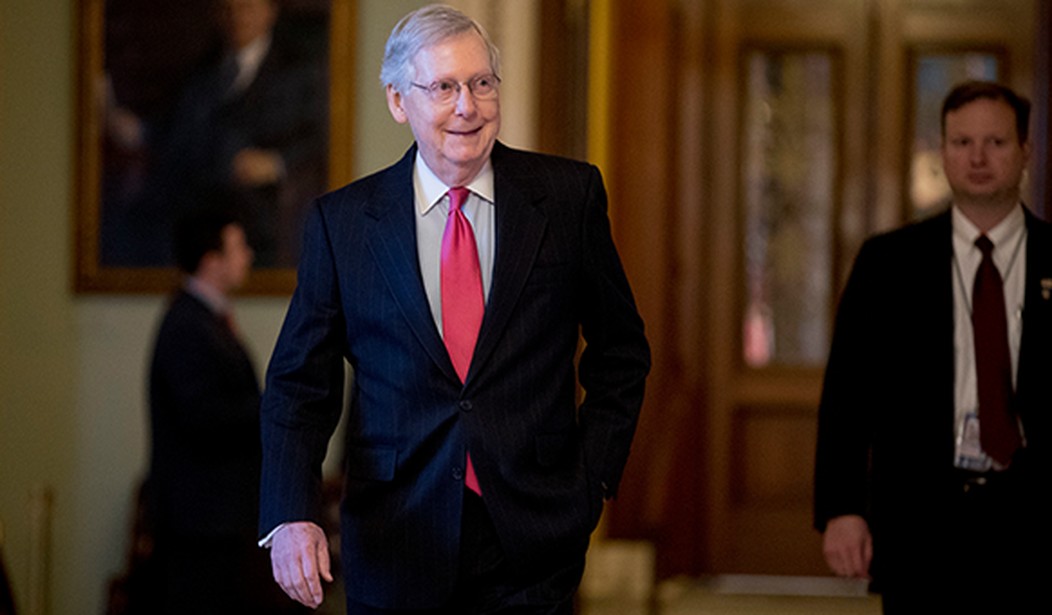Mitch McConnell seems to have found a way to allow President Donald Trump to eat his cake (Mar-a-Lago chocolate, no doubt) and keep it, too. On Thursday, the Senate majority leader announced that the president would sign compromise legislation hammered out in the wake of the 35-day government shutdown over funding for additional barriers along our southern border. In return, McConnell will support the president's declaration of a "national emergency" that will allow the administration to use military dollars to build more fencing than Congress has appropriated for that purpose. Expect much of the country, including many in Congress, to choke on McConnell's appeasement.
No matter how many times or in how loud a voice the president says it, there is no emergency at the border requiring flouting the separation of powers, which gives Congress control over the purse strings. The United States is not being flooded with dangerous criminals and job-stealing immigrants from south of the border. Immigrants, including those who have come here illegally, are less likely to commit crimes than people born here. El Paso, Texas -- where the president visited this week to show off what happens when you build a wall -- was safe long before the wall was built and is one of the safest cities its size in America today even with a large population of immigrants, documented and undocumented. And even the president has now admitted that we need more immigrants -- not fewer, which is what he had been proposing since his campaign -- to fill jobs that no one else is taking.
But truth doesn't matter to this administration. There is no military emergency at the border that justifies reallocating funds, especially at a time when there are emergencies requiring U.S. support in Syria and Afghanistan, where Trump is drawing down troops. Maybe Trump hopes no one will make the connection.
What is surprising -- and more than a little disheartening -- is when someone as smart as McConnell plays along. McConnell could have delivered an important message to the White House: "This is the best you are going to get. Accept it, and don't try to tread on congressional turf by usurping our authority to appropriate funds. If you veto the bill, I will allow a vote to override your veto and I will get all of the Democrats and enough Republicans to pass it without your signature." Now that would have delivered an important conservative message. Congress is not only a coequal branch of government but the first branch as defined in Article 1 of the Constitution.
Recommended
For too long, the executive branch has encroached on the prerogatives of the legislative branch. President Trump has followed in the footsteps of his immediate predecessor, Barack Obama, in using executive authority to accomplish what he couldn't win approval for in Congress. When Trump doesn't get his way, he simply issues orders to do what he wants anyway, which is what he will do if he declares an emergency at the border. It will be up to the third branch, the judicial branch, to stop the president from ignoring the legitimate limits the Constitution places on his power. But whether that will happen may depend on whether the conservatives on the Supreme Court live up to the principles of limited government they espouse. If they cave as McConnell has, maybe Trump's wall will get built after all.
In the end, Trump's power grab and theatrics can only be stopped by the American people. Polls suggest that most Americans don't want a wall and don't want to pay for it. Whether enough of them will rally to oppose him in the next election is anyone's guess -- and will depend largely on the options before them. But one thing is for sure. If Democrats do win the White House in the next election, you can expect a Democrat to follow Trump's lead. Congress will become ever less important as the imperial presidency expands the power of one man -- or woman -- with fewer checks and balances than our Founding Fathers envisioned. Our American republic will be the worse for it.
Linda Chavez is chair of the Center for Equal Opportunity and a senior fellow at the Niskanen Center.

























Join the conversation as a VIP Member